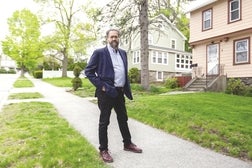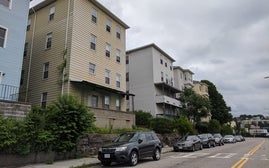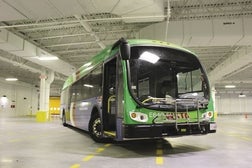Residents Voice Concern Over Worcester Slots
 Jacquelyn Gutc
Lorraine Laurie, chairwoman of the Green Island Residents' Group, testifies before members of a City Council subcommittee Monday night. She said residents would rather see a bank and supermarket than a slots parlor in the area.
Jacquelyn Gutc
Lorraine Laurie, chairwoman of the Green Island Residents' Group, testifies before members of a City Council subcommittee Monday night. She said residents would rather see a bank and supermarket than a slots parlor in the area.
Worcester officials heard a resounding disapproval of putting a slots parlor in what was intended to be a chance for the public to share their ideas last night for what should go into a host community agreement with gaming developers.
About 100 people filled a room at the Hibernian Cultural Center for a joint meeting of the City Council's economic development and public safety committees, where about 40 people testified for more than two hours.
At the beginning of the hearing, Co-Chairman and Councilor-At-Large Frederick Rushton reminded the crowd that voters will ultimately decide the fate of a $240-million slots and hotel proposal.
Similar reminders were given to the crowd throughout the night, but most speakers chose to warn against allowing the slots parlor proposed for the 14-acre Wyman-Gordon site near Kelley Square.
Rushton urged attendees to "tell your concerns to your neighbors."
Another public hearing on the issue is scheduled for Wednesday, April 17. Following the hearings, which City Manager Michael O'Brien will present an agreement between him and the developers to the city council for its approval. After that, the proposal will be voted on by city residents.
The anti-slots parlor sentiment was largely fueled by concerns over increased gambling addictions and personal bankruptcies, higher poverty, a negative impact on local busineses and low-paying jobs.
Residents and activists for the Green Island, where the slots would be, said they would prefer seeing a bank, grocery store and pharmacy in the area.
"This is not our first choice," said Lorriane Laurie of the Green Island Residents Group. "We are not doing cartwheels for this."
John Giangregorio, president of the Canal District Business Alliance, called it exciting and flattering that a developer wants to invest in Worcester and said he wants part of the deal to include the reopening of the Blackstone Canal, which is covered by Harding Street. In 2003, the city commissioned a feasibility study that found it is possible to reopen the canal for $20 million to $30 million.
"Our vision is to create a destination neighborhood," Giangregorio said.
Many expressed skepticism that a slots parlor would be good for local businesses, saying gambling sites are built to be self-contained entertainment sites.
"There is no spinoff because people are not allowed out of the casino," said Allen Fletcher, suggesting that the slots facility not be allowed to have restaurants so that patrons will seek food from the area's restaurants.
And Art Shea said the close access to the site from Interstate 290 and Route 146 would lead visitors to easily get in and out of the city without going beyond the slots facility.
Susan Moynagh suggested economic spinoff could come to the area if developers partner with local businesses for their supplies.
Many were concerned about the jobs Chicago-based Rush Street Gaming and Carpenter & Co. of Cambridge have promised for the city. Carpenter and Rush Street, whose subsidiary. Mass Gaming & Entertainment LLC, is one of four entities vying for one slots license in the state, has said 500 to 600 jobs will come to the city if a slots parlor and hotel — which O'Brien would be in CitySquare — are approved.
Lee Bona, president of the Worcester Area League of Women Voters, called the jobs expected at the facility "go nowhere jobs."
Alejandra Duarte of Unite Here, which represents workers in the hotel, gaming and food service industries, and others stressed that workers' rights need to be secured.
"It's important to bring good jobs, not just jobs," Duarte said.
Kate O'Neil of Unite Here, said she wants to see the city ensure there are protections in place to make sure the developers can't go back on promises of jobs and what they'll pay in taxes.
Roberta Schaefer of the Worcester Regional Research Bureau, which recently issued a report against bringing slots into the city, said, "I no longer feel alone in this effort" after hearing several others testify.
She asked councilors to get job descriptions and wages expected from the developers, and find out whether they will be part or full time and whether they'll have benefits.
Many spoke about the concern of an increase in crime and prostitution and called for more police in the area. They were told Police Chief Gary Gemme is communicating with other communities that have allowed gambling to determine issues they've faced and how they've handled them.
Infrastructure was also a key issue as many noted that Kelley Square – which O'Brien said was on the "National Register of Historic Traffic Problems" — will need to be redeveloped.
Not everyone was against the idea of a slots parlor. Some supported the proposal because of the increased tax revenue, which could rise from about $40,000 to at least $5 million annually.
John Reed came forward in support of the proposal from an environmental perspective, suggesting the facility have a green roof and be used as a springboard for a beautification project. He said he favors "turning a brownfield into a greenfield."
Read more
Briefing: Slots Approval Process
As Worcester Considers Slots, How Has Gambling Impacted Other Communities?













0 Comments